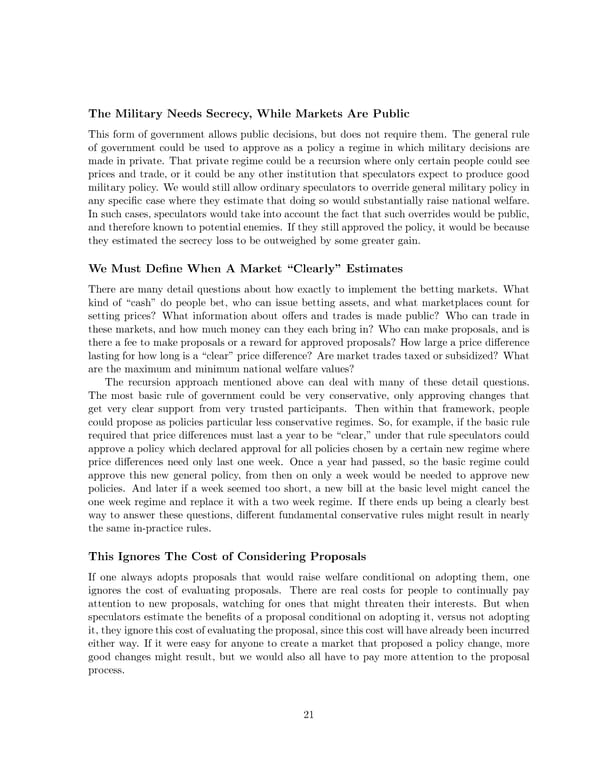The Military Needs Secrecy, While Markets Are Public This form of government allows public decisions, but does not require them. The general rule of government could be used to approve as a policy a regime in which military decisions are made in private. That private regime could be a recursion where only certain people could see prices and trade, or it could be any other institution that speculators expect to produce good military policy. We would still allow ordinary speculators to override general military policy in any specific case where they estimate that doing so would substantially raise national welfare. In such cases, speculators would take into account the fact that such overrides would be public, and therefore known to potential enemies. If they still approved the policy, it would be because they estimated the secrecy loss to be outweighed by some greater gain. WeMust Define When A Market “Clearly” Estimates There are many detail questions about how exactly to implement the betting markets. What kind of “cash” do people bet, who can issue betting assets, and what marketplaces count for setting prices? What information about offers and trades is made public? Who can trade in these markets, and how much money can they each bring in? Who can make proposals, and is there a fee to make proposals or a reward for approved proposals? How large a price difference lasting for how long is a “clear” price difference? Are market trades taxed or subsidized? What are the maximum and minimum national welfare values? The recursion approach mentioned above can deal with many of these detail questions. The most basic rule of government could be very conservative, only approving changes that get very clear support from very trusted participants. Then within that framework, people could propose as policies particular less conservative regimes. So, for example, if the basic rule required that price differences must last a year to be “clear,” under that rule speculators could approve a policy which declared approval for all policies chosen by a certain new regime where price differences need only last one week. Once a year had passed, so the basic regime could approve this new general policy, from then on only a week would be needed to approve new policies. And later if a week seemed too short, a new bill at the basic level might cancel the one week regime and replace it with a two week regime. If there ends up being a clearly best way to answer these questions, different fundamental conservative rules might result in nearly the same in-practice rules. This Ignores The Cost of Considering Proposals If one always adopts proposals that would raise welfare conditional on adopting them, one ignores the cost of evaluating proposals. There are real costs for people to continually pay attention to new proposals, watching for ones that might threaten their interests. But when speculators estimate the benefits of a proposal conditional on adopting it, versus not adopting it, they ignore this cost of evaluating the proposal, since this cost will have already been incurred either way. If it were easy for anyone to create a market that proposed a policy change, more good changes might result, but we would also all have to pay more attention to the proposal process. 21
 Shall We Vote on Values, But Bet on Beliefs? Page 22 Page 24
Shall We Vote on Values, But Bet on Beliefs? Page 22 Page 24